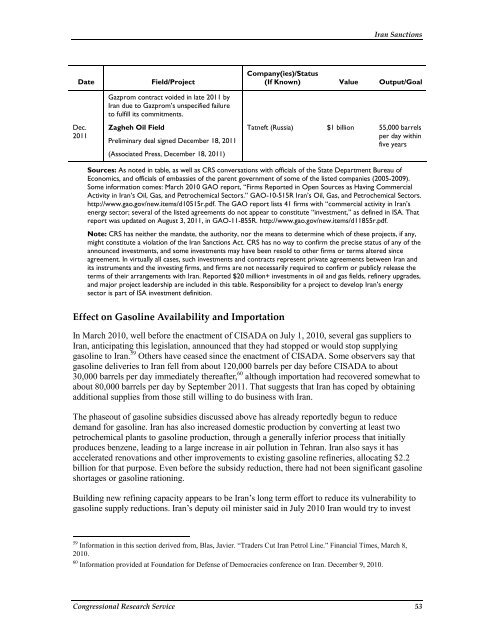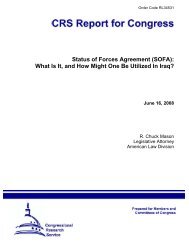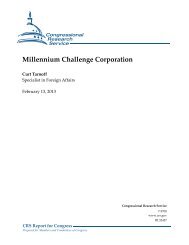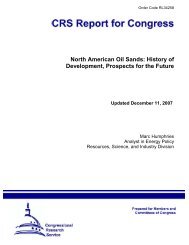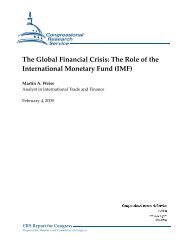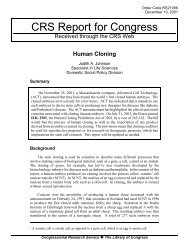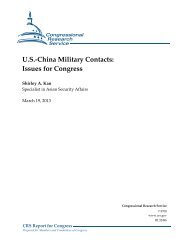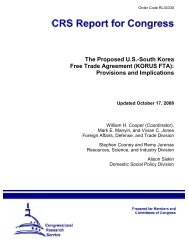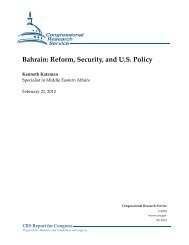Iran Sanctions - Foreign Press Centers
Iran Sanctions - Foreign Press Centers
Iran Sanctions - Foreign Press Centers
You also want an ePaper? Increase the reach of your titles
YUMPU automatically turns print PDFs into web optimized ePapers that Google loves.
Date Field/Project<br />
Dec.<br />
2011<br />
Gazprom contract voided in late 2011 by<br />
<strong>Iran</strong> due to Gazprom’s unspecified failure<br />
to fulfill its commitments.<br />
Zagheh Oil Field<br />
Preliminary deal signed December 18, 2011<br />
(Associated <strong>Press</strong>, December 18, 2011)<br />
<strong>Iran</strong> <strong>Sanctions</strong><br />
Company(ies)/Status<br />
(If Known) Value Output/Goal<br />
Tatneft (Russia) $1 billion 55,000 barrels<br />
per day within<br />
five years<br />
Sources: As noted in table, as well as CRS conversations with officials of the State Department Bureau of<br />
Economics, and officials of embassies of the parent government of some of the listed companies (2005-2009).<br />
Some information comes: March 2010 GAO report, “Firms Reported in Open Sources as Having Commercial<br />
Activity in <strong>Iran</strong>’s Oil, Gas, and Petrochemical Sectors.” GAO-10-515R <strong>Iran</strong>’s Oil, Gas, and Petrochemical Sectors.<br />
http://www.gao.gov/new.items/d10515r.pdf. The GAO report lists 41 firms with “commercial activity in <strong>Iran</strong>’s<br />
energy sector; several of the listed agreements do not appear to constitute “investment,” as defined in ISA. That<br />
report was updated on August 3, 2011, in GAO-11-855R. http://www.gao.gov/new.items/d11855r.pdf.<br />
Note: CRS has neither the mandate, the authority, nor the means to determine which of these projects, if any,<br />
might constitute a violation of the <strong>Iran</strong> <strong>Sanctions</strong> Act. CRS has no way to confirm the precise status of any of the<br />
announced investments, and some investments may have been resold to other firms or terms altered since<br />
agreement. In virtually all cases, such investments and contracts represent private agreements between <strong>Iran</strong> and<br />
its instruments and the investing firms, and firms are not necessarily required to confirm or publicly release the<br />
terms of their arrangements with <strong>Iran</strong>. Reported $20 million+ investments in oil and gas fields, refinery upgrades,<br />
and major project leadership are included in this table. Responsibility for a project to develop <strong>Iran</strong>’s energy<br />
sector is part of ISA investment definition.<br />
Effect on Gasoline Availability and Importation<br />
In March 2010, well before the enactment of CISADA on July 1, 2010, several gas suppliers to<br />
<strong>Iran</strong>, anticipating this legislation, announced that they had stopped or would stop supplying<br />
gasoline to <strong>Iran</strong>. 59 Others have ceased since the enactment of CISADA. Some observers say that<br />
gasoline deliveries to <strong>Iran</strong> fell from about 120,000 barrels per day before CISADA to about<br />
30,000 barrels per day immediately thereafter, 60 although importation had recovered somewhat to<br />
about 80,000 barrels per day by September 2011. That suggests that <strong>Iran</strong> has coped by obtaining<br />
additional supplies from those still willing to do business with <strong>Iran</strong>.<br />
The phaseout of gasoline subsidies discussed above has already reportedly begun to reduce<br />
demand for gasoline. <strong>Iran</strong> has also increased domestic production by converting at least two<br />
petrochemical plants to gasoline production, through a generally inferior process that initially<br />
produces benzene, leading to a large increase in air pollution in Tehran. <strong>Iran</strong> also says it has<br />
accelerated renovations and other improvements to existing gasoline refineries, allocating $2.2<br />
billion for that purpose. Even before the subsidy reduction, there had not been significant gasoline<br />
shortages or gasoline rationing.<br />
Building new refining capacity appears to be <strong>Iran</strong>’s long term effort to reduce its vulnerability to<br />
gasoline supply reductions. <strong>Iran</strong>’s deputy oil minister said in July 2010 <strong>Iran</strong> would try to invest<br />
59<br />
Information in this section derived from, Blas, Javier. “Traders Cut <strong>Iran</strong> Petrol Line.” Financial Times, March 8,<br />
2010.<br />
60<br />
Information provided at Foundation for Defense of Democracies conference on <strong>Iran</strong>. December 9, 2010.<br />
Congressional Research Service 53


